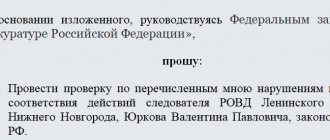Causes
Any unlawful action towards a victim or detainee may be grounds for filing a complaint against the actions of the investigator. In unclear situations, you need to express your disagreement; all claims must be recorded in writing, otherwise the applicant will not be able to prove the presence of unlawful actions.
Investigators may commit formal violations of regulations :
- improper conduct of investigative actions;
- registration without witnesses or with witnesses who do not comply with the law;
- conducting an investigation without a lawyer.
And also the grossest errors in the norms of the Criminal Code of the Russian Federation on constitutional human rights:
- violations during search, seizure and examination of evidence;
- rude actions towards the suspect;
- falsification of protocols;
- transfer of information to third parties.
Objections to the actions of the investigator should be expressed in due time. You shouldn’t grab the handle at the slightest disagreement.
If a complaint about unlawful actions of an investigator is written for several violations at once, this will help in the defense strategy.
What is inaction?
If we rely on the requirements of the Code of Criminal Procedure, we can conclude that inaction can take any form, therefore the author of the appeal is practically unlimited in formulating his demands.
Illegal inaction is considered as evasion or unreasonable refusal to perform his official duties, which the investigator must perform due to the requirements of regulations. This is a fairly significant violation and entails sanctions, since inaction implies a violation and infringement of the rights and interests of citizens and directly affects the timing and results of the investigation.
Examples of inaction include:
- refusal to call witnesses;
- refusal to order an examination;
- refusal to use measures that allow preserving property;
- not conducting interrogations;
- refusal to require evidence.
However, this list can be continued almost indefinitely; in fact, inaction is an unjustified avoidance of investigative actions, which are provided for by current legislation.
The main thing is to remember before filing a complaint with the prosecutor about the inaction of the investigator (a sample is given below) that not only this official, but also the prosecutor and the prosecutor are involved in the criminal process. Therefore, it is very important to determine whose fault the process is being delayed.
How to submit?
A complaint against an investigator is filed according to the general rules of office work, because there is no precisely established form approved by law.
The claim must contain:
- Full name or address, state body and position to whom the complaint is sent;
- Full name, address, phone number or other contact information of the applicant. Description of all unlawful actions or decisions of the investigator, indicating the full name and position;
- a complaint to recognize the actions or inactions of the investigator as illegal in accordance with Art. 124 Code of Criminal Procedure of the Russian Federation;
- the essence of the matter is stated: clearly and specifically, without unnecessary emotions and details;
- Based on the above, guided by Art. 123 Code of Criminal Procedure of the Russian Federation, Art. 124 Code of Criminal Procedure of the Russian Federation, 2 Criminal Code of the Russian Federation, Art. 2, Art. 45 of the Constitution of the Russian Federation;
- a request to restore violated rights or take action against an official;
- signature and date of filing the complaint.
To the head of the investigative body
The first authority to file a complaint against an investigator is his superior management. In most cases, this is an affordable and fastest means of resolving any misunderstandings.
You can file a complaint with management:
- On a personal visit.
- Through the secretary. The completed complaint along with the passport is handed over to the secretary, who registers everything. An authorized representative of the originator can also file a complaint. To do this, he must have with him the applicant’s documents and a power of attorney to defend his interests.
- By registered mail with notification and an inventory, for example, via Russian Post.
- On the website of the Ministry of Internal Affairs of the Russian Federation. You must select the desired organization from the “List of departments for receiving complaints,” fill out all the fields and attach a file with the complaint.
To the investigative committee
A complaint filed with the Investigative Committee of Russia is no longer considered a complaint, but is considered as a statement about the commission of a crime by the investigator . In particular, as a deliberate violation of the law. The bodies of the Investigative Committee of the Russian Federation are obliged to launch an investigation in accordance with Article 447 of the Code of Criminal Procedure of the Russian Federation and 448 of the Code of Criminal Procedure of the Russian Federation on the basis of a statement.
The application is submitted:
- personally;
- through the reception secretary;
- by registered mail with acknowledgment of receipt;
- on the website of the Investigative Committee of the Russian Federation in the upper left part of the page in the “Internet reception” section you need to fill out all the data on the form and upload the collected documents;
- via hotline.
To the prosecutor's office
If there is no response from the leadership of the investigation department to the filed complaint, it is redirected to the prosecutor's office. The prosecutor's office is the supervisory authority in relation to the investigative department.
A complaint can be filed only if the head of the investigation department and the investigative committee refuse to consider it.
The complaint is submitted:
- at a personal reception;
- through the reception;
- by registered mail with acknowledgment of receipt;
- on the website of the Prosecutor General's Office of the Russian Federation. Before submitting an application, you need to register, then fill out the form according to the sample.
To court
In case of refusal to consider a complaint from all three listed authorities, the applicant has the right on the basis of Art. 125 of the Code of Criminal Procedure of the Russian Federation will go to court. It is better to file a complaint with the court if you have a lawyer and a clear confidence that the stated complaint will be satisfied.
If the investigator extorts a bribe or threatens to damage the applicant’s reputation by planting illegal drugs, in such cases you can write a complaint:
- to the internal security department of the Ministry of Internal Affairs, FSB;
- by calling the hotline at 8-800-222-74-47.
You can also write to the Prosecutor General’s Office on the website by first registering using the form.
What to write?
A complaint to the prosecutor's office about the inaction of an internal affairs investigator must contain:
- name of the recipient of the document, address;
- information about the applicant;
- data of the investigator or inquiry officer, whose inaction is subject to appeal, his place of work, full name;
- the essence of the issue, that is, a brief description of the inaction;
- references to articles of regulations that, in the opinion of the applicant, were violated (you can refer to Article 123 of the Code of Criminal Procedure, which allows you to appeal against the inaction of an official);
- the requirements put forward by the applicant;
- list of attached documents;
- date, signature and its transcript of the originator of the appeal.
If a lawyer files a complaint about the investigator’s inaction, his data is also indicated, including a document confirming his authority (power of attorney), which is indicated in the appendices and goes as an addition to the complaint.
The text of the document should be written only in business style. There should be no unnecessary reasoning, insults or emotional statements.
What should be the response to a complaint?
The response to a complaint depends on which authority it was sent to.
- A complaint sent to the head of the investigation department is considered from 3 to 10 days, the decision is sent to the applicant’s address in writing. In case of refusal, the letter indicates further possible actions.
- The Investigative Committee considers the application within 10 days, and the response is sent to the applicant in writing. If the investigation is refused, all charges against the investigator are dropped.
- The prosecutor's office also responds by sending a letter to the applicant; if the applicant's complaint is satisfied, the case is sent to court. In case of refusal, the complaint is returned to the applicant.
- When filing a complaint with the court, the complaint is considered within the time limits strictly established by the court. Unfortunately, if the court refuses to consider the case, the complaint is returned to the investigative committee, and the applicant is notified in writing.
Review procedure
The procedure for filing and considering a complaint to the prosecutor's office regarding the investigator's inaction is regulated by Article 124 of the Code of Criminal Procedure. This type of appeal is dealt with by an official working in the department for supervision of the work of investigative authorities.
The complaint must be considered within 3 days. If the stated circumstances require additional investigation, the period may be extended to 10 days. The applicant must be notified of the extension of the deadline.
After consideration of the appeal, three types of decisions can be made:
- refusal;
- full satisfaction of requirements;
- partial satisfaction of requirements.
Not only the applicant, but also the investigator has the right to appeal the decision.
What to do if there is no reaction?
You need to be prepared for the fact that every management will unsubscribe from the complaint in an attempt to get rid of it.
If the application is refused again, the complaint must be appealed to higher management. You should not give in to emotions; each time the description of the complaint must correspond to the truth and show a clear picture of what happened.
It is important to control the timing of consideration and, if a refusal is received, to transfer the case further up the chain of command.
It will be difficult for a person who is not legally savvy to understand all the delays and replies, so you may want to think about getting qualified assistance from a lawyer.
Where else can you go?
If the applicant is not satisfied with the decision taken on a complaint to the prosecutor’s office about the investigator’s inaction (a sample is given in the text), then he has the right to appeal even to the Prosecutor General’s Office. However, you should know that you can contact the higher management of the district prosecutor only after contacting the first one directly. That is, you can turn to the Prosecutor General only after going through the first instance.
Inaction by law enforcement officials can also be addressed in court. Most often, people go to court with complaints about refusal to accept a report of a crime committed, in case of termination of criminal proceedings or in case of refusal to initiate a case. They often go to court if the investigator does not want to check the information provided about the crime.
You should also go to court at the place where the preliminary investigation is being conducted. Such requests must be considered within 5 days from the date of receipt. The court hearing is held in the presence of the applicant, investigator and other participants in the process. The absence of one of the parties is not a reason to postpone the meeting. The judge can also make three types of decisions, like a prosecutor, that is, either satisfy the requirements (in whole or in part) or refuse.
Who can complain
Any person involved in a criminal investigation on the part of the prosecution may demand justice:
- Accused, suspects, defendants and defenders.
- Prosecutors, victims, plaintiffs or their official representatives.
- Employees of the court, the Investigative Committee (IC), and the prosecutor's office.
- Guardians or legal representatives of minor children participating in the case.
- Translators and experts.
- Witnesses and witnesses.
Important! If the investigator distinguished himself not by inaction, but by committing an obvious illegal act, the injured citizen will be asked to draw up not a complaint, but an application to initiate an inspection and trial.
A person who is not a participant in the criminal process cannot file a claim against the investigator, because he has no legal basis for this. You can appeal the actions of an incompetent employee only in 3 places: the Investigative Committee (IC), the prosecutor's office and the court.
Compilation rules
The current legislation does not provide for strict requirements for the form and content of a complaint against an investigator. It is enough for the applicant to adhere to the general rules of office work:
- Present information concisely.
- Avoid using expressive language.
- Pay sufficient attention to the substantiation of claims; only appeals with irrefutable evidence will be considered in favor of the applicant.
- If the investigator made decisions that violate your rights, they should be attached to the application.
- It will be necessary to indicate which legal norm should be applied to the official.
Legal advice! The rights and responsibilities of the investigator are enshrined in the Code of Criminal Procedure of the Russian Federation, therefore, in the event of violations on the part of the executive, one must refer to this regulatory document.
The right of citizens to appeal the actions of the investigator is enshrined in Art. 123 Code of Criminal Procedure of the Russian Federation.
The legislative framework
The complaint procedure is regulated by the following legal acts:
- Order of the Investigative Committee at the Prosecutor's Office of the Russian Federation dated September 19, 2007 N 17 (as amended on 04/08/2008) “On the implementation of the Instructions on the procedure for considering applications and receiving citizens in the system of the Investigative Committee at the Prosecutor's Office of the Russian Federation.”
- “Criminal Procedure Code of the Russian Federation” dated December 18, 2001 N 174-FZ (as amended on July 1, 2017).
- Federal Law “On the Prosecutor's Office of the Russian Federation” of January 17, 1992 N 2202-1.
- Federal Law “On the procedure for considering appeals from citizens of the Russian Federation” dated May 2, 2006 N 59.
Results of an internal audit of a complaint to the prosecutor's office
At the end of the internal inspection, one of the following decisions is made regarding the investigator:
- About the absence of any contradiction to the law in the actions of the investigator. In such situations, a person who previously filed a complaint against the investigator may be re-interviewed on this fact, and if his testimony differs from reality, the applicant may be held accountable for providing false information to the prosecutor's office.
- On imposing a disciplinary sanction on the investigator.
- On the release of the investigator from his position and dismissal: from the territorial department of the internal affairs department, with the possibility of employment in government agencies in the future, or from the internal affairs department without reinstatement.
- On dismissal and bringing to legal liability: administrative or criminal.
The investigator does not have the right to refuse to carry out verification actions against him on the basis of a complaint.
The results of an internal audit may be appealed by the investigator in respect of whom it was carried out, upon completion of its conduct, including with the involvement of a lawyer or other specialist in legal advice and support.
Expert commentary
Roslyakov Oleg Vladimirovich
Lawyer, specialization civil law. More than 19 years of experience.
Ask a question
If the result of the internal inspection did not satisfy the applicant who filed the complaint that served as the basis for its conduct, such person has the right to appeal the actions of the prosecutor’s office employees as biased or unlawful to a higher state body.
Lawsuit
The trial regarding the illegality of the investigator’s actions is held in an open format. The plaintiff (or his legal representative) and the accused employee must be present in the courtroom.
A citizen must submit an application to the district court, the location of which coincides with the area where the preliminary investigation is being conducted. If there are several courts in the area at once, the claim is sent to where the investigative body is located.
A properly executed document should include:
- name of the court receiving the complaint;
- Full name and complete contact information of the plaintiff;
- Full name of the official representative if he represents the interests of the victim;
- presentation of the essence of the case and support of what is written with factual evidence;
- description of requirements;
- date and signature.
The claim may be:
- filed personally with the court clerk;
- sent by a valuable letter with acknowledgment of delivery;
- submitted through a legal representative.
At the end of the trial, the citizen’s claim may be partially or fully satisfied, or rejected with an explanation of the reasons.
Meaning of the complaint
A complaint about the investigator's inaction is of serious importance. It lies in the ability to influence the investigation process, as well as to record violations committed by the investigator if there is still no proper response to the complaint. Thus, she will play a role in the future when the case comes to court.
Despite the abolition of the right to send the case for further investigation, before considering the materials on the merits, the judge has the right to make comments. They are transferred to the prosecutor's office, and from there to the investigator. This procedure is possible as part of a preliminary meeting. At this stage, the question of whether the case is ready for consideration is decided.
Violations ignored in the first instance may play a role at the stage of appeal, cassation or supervision.











